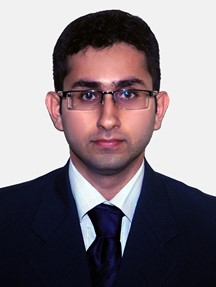“Energy-Efficient Secure Communication and Sensing Modalities for the Internet of Bodies (IoB)”
Monday, Feb. 21 at 1:00pm
Via Zoom
Email communications@ece.ufl.edu for Zoom info
Abstract
The last few decades have witnessed an unprecedented growth in multiple areas of electronics spanning low-power sensing, intelligent computing and high-speed wireless connectivity. In the foreseeable future, there would be hundreds of billions of computing devices, sensors, things and people, wherein the technology will become intertwined with our lives through continuous interaction and collaboration between humans and machines. Such human-centric ideas give rise to the concept of internet of bodies (IoB) which calls for novel and energy-efficient techniques for sensing, processing and secure communication for resource-constrained IoB nodes. As we have painfully learnt during the pandemic, point-of-care diagnostics along with continuous sensing and log-term connectivity has become one of the major requirements in the healthcare industry, further emphasizing the need for energy-efficiency and security in the resource-constrained devices around us.
With this vision in mind, Baibhab will present his current research in two parts. The first part of this seminar will involve the fundamentals of developing energy-efficient electro-quasistatic (EQS) communication techniques for IoB wearables as well as implants, and will demonstrate 2 examples: 1) Adiabatic Switching for breaking the αCV2f limit of power consumption in capacitive voltage mode human-body communication (HBC), and 2) Bi-Phasic Quasistatic Brain Communication (BP-QBC) for fully wireless data transfer from a sub-6mm3, 2μW brain implant. A custom modulation scheme, along with adiabatic communication enables wireline-like energy efficiencies (<5pJ/b) in HBC-based wireless systems, while the BP-QBC node, being fully electrical in nature, demonstrates sub-50pJ/b efficiencies by avoiding DC power consumption as well as the transduction losses observed in competing technologies, involving optical, ultrasound and magneto-electric modalities. The second part of this seminar will cover time-domain sensing techniques which allow inherent energy-resolution scalability, and will show the fundamental limits of achievable resolution. As an example, a radiation sensing system will be shown for occupational dosimetry in healthcare and mining applications, which can achieve 12-18 bit resolution with 0.01-1 μJ energy dissipation. Such energy-efficient sensing and communication techniques, when combined with intelligent in-sensor-analytics at the resource-constrained nodes, can potentially pave the way for perpetual, and even battery-less systems for next-generation IoT, IoB and healthcare applications. I plan to conclude this talk with my future research plan and interests.
Biography
Baibhab Chatterjee received his B.Tech. degree in ECE from NIT Durgapur, India in 2011 and M.Tech. degree in EE from IIT Bombay, India in 2015. He is currently a final-year Ph.D. Candidate in the Elmore Family School of Electrical and Computer Engineering, Purdue University, USA. He was with Intel, India as a Digital Design Engineer during 2015-2017, and with Tejas Networks, India as an R&D Engineer during 2011-2012. He interned at the IBM T.J. Watson Research Center during Summers of 2020 and 2021, working on Cryo-CMOS implementations of quantum readout and control circuitry. His current research interests include energy-efficient designs for secure communication, sensing and analytics for body area networks using analog, mixed-signal and RF techniques. He has authored/co-authored more than 50 conference and journal publications. He received the Bilsland Dissertation Fellowship and the Frederick N. Andrews Fellowship at Purdue University for Academic and Research Excellence, the Best Student Poster/Paper Awards in IEEE HOST 2018/2019, the Best Paper Awards in IEEE CICC 2019/2021, and the IEEE Microwave 3MT Award in IEEE IMS/RFIC 2020. Baibhab serves as a reviewer for IEEE/ACM journals and conferences including JSSC, TCAS-I, TBioCAS, TVLSI, IOT-J, SSCL, MWCL, ISCAS, VLSID, and EMBC. He served as a TPC member in IEEE VLSID 2021, as a student advisor for the SRP session in IEEE ISSCC 2020, and as a part of the Purdue NanoDays initiative designed towards inspiring K-12 students in taking up a career in STEM.

